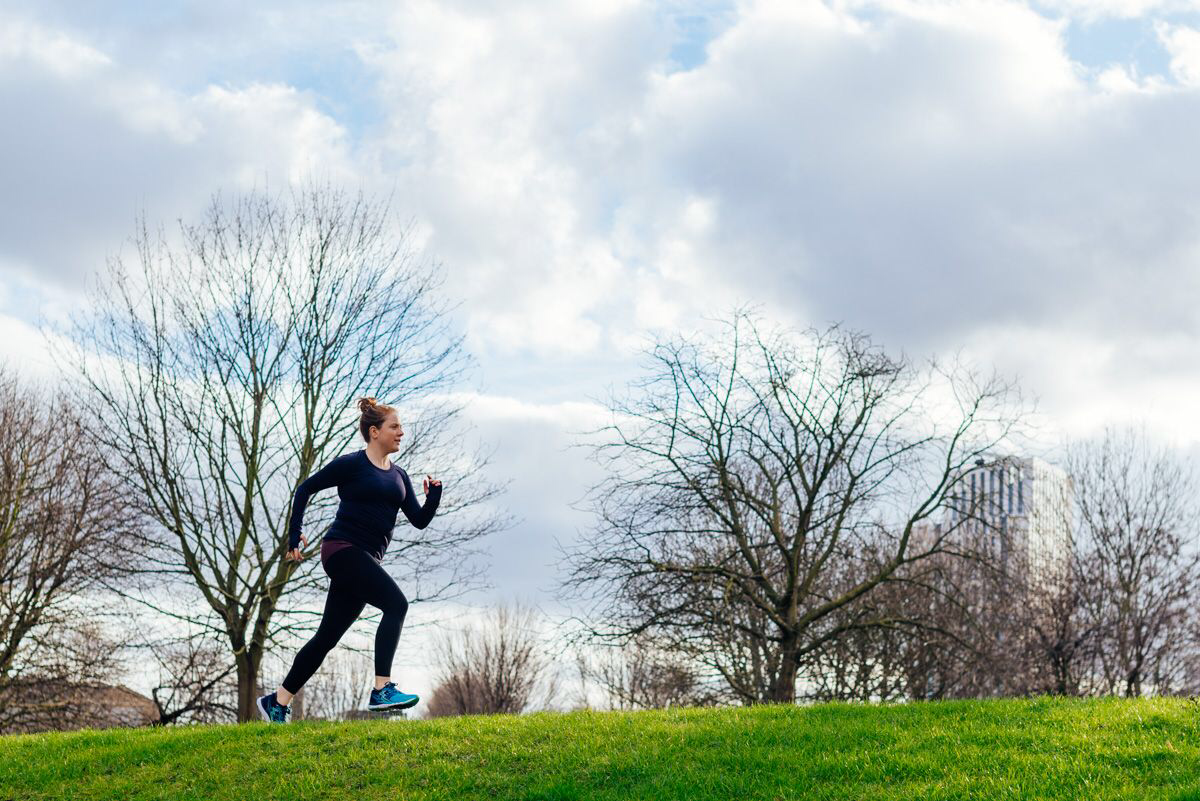Why Running Is Good For Your Mental Health
image: Anna Rachel Photography
Did you know that exercise can be as effective as taking medication for treating mild depression? (Stathopoulou et al 2006)
If I'm being very honest I used to be sceptical of the the idea that running could help manage depression. I remember scoffing when a former flatmate suggested that a jog around the park could be just what I needed, little did I know a decade later I'd be sharing research that suggests a run really can help you feel better.
I'm always wary of sharing posts like this, I'm the first person to highlight that mental health is complex and often it is not simply a case of doing X, Y or Z to feel better. However, for mild depression physical exercise is recommended as a first line treatment by the NHS, and in other case can be a useful tool to help you live well in the world. None of the information shared in this post should be seen as a substitute for medical advice I'd really encourage anyone who is struggling in anyway with their mental health to seek professional help.
Short Term Highs
Most of us have come across the idea that when we run chemicals called endorphins are released that make us feel good Boecker et al, 2008). However, endorphins aren’t the only chemicals at play, endocannabinoids are biochemical substances produced by our bodies that bind to the same receptors in our brains as THC (the chemical in marijuana that makes you high) and according to some studies they work in tandem with our endorphins to give us that runner’s high (Raichien et al, 2012). However, this high doesn’t actually last that long so it can’t really explain the long term impact running can have on the brain.
Long Term Changes In The Brain
In 2012 Salmon et al published a study called ‘Effects of Physical Exercise on Anxiety, Depression and Sensitivity to Stress’ which concluded that “exercise training recruits a process which confers enduring resilience to stress.” In basic terms - running helps us manage stress better.
Salmon’s observation was that running regularly helps us manage stress more effectively because it causes the same two changes that we think (because actually we don’t know how anti-depressants work) are what make antidepressants effective - increasing levels of endorphins and endocannabinoids (discussed above) and neurogenesis - which is where things get really interesting!
Neurogenesis is the creation of new neurons due to the protein brain-derived neurotrophic factor that helps neurons wire and fire together, and what’s really cool is that this can happen in the hippocampus - an area of the brain that might be smaller if you have depression and research shows can increase in size with regular exercise such as running(Den Ouden et al. 2018). I actually can’t get over how cool this is, through movement you can actually change the size of your brain (well, parts of it)!
Shifting Perspectives
Running regularly can also affect how you think about things. Running can become a welcome break from difficult thoughts when you have depression and as you clock up the minutes and the miles little wins start to emerge that, hopefully, help you see some light amongst those difficult thoughts. What’s more is that running can be hugely empowering because once you recognise that it can have a positive effect on your wellbeing and you take ownership of that. I’ve written about how running changed my outlook on life here, but it short it helped me realise I was so much more capable than I thought I was, and in turn that contributed to improving my mental health.
Why Running?
What is it about running that means it’s particularly effective when it comes to managing mental health problems? Reichert et al (2017) et al have observed that every day activities (like climbing the stairs) don’t have the same effect as purposefully working out and that aerobic exercise such as running seems to be more effective when it comes to boosting our moods than resistance workouts. From my own experiences I find running gives me a freedom I can’t find anywhere else. I can do it any time, it’s free and it’s up to me how far and how fast I go. Once I hit my flow state (around 20 minutes in) I’m flying, something that just doesn’t happen when I’m lifting weights or cycling and need to concentrate more on my equipment.
Making Running Part of your Routine
It’s clear that running is good for your mental health, but to feel these benefits you need to be hitting the pavement on a regular basis over an extended period of time, the highs that come from endorphines and endocannabinoids are short lived and neurogenesis takes time.
Getting out of the door is one of the hardest things about running, regardless of whether you're depressed or not. Over the years there are a few things I've found really helpful when it comes to getting moving when I'm not feeling at my best.
RUNNING FRIENDS - I’d be lost without my running friends. Knowing that someone is relying on me to turn up and run with them is a huge motivator. However accountability is just one part of the story, running is quality time away from distractions when you can have those deep conversations we all need from time to time to stay balanced. I can’t begin to count the chats I’ve had with friends when one or other of us has been struggling that have helped us shift the narrative.
ROUTINE - when you’re struggling with life routine can be really helpful. Having a simple training plan (and a friend relying on you!) can help you get out the house even when you don’t want to and gives some structure to a day that might otherwise seem never ending.
GOALS - working towards a goal can help give you a focus when life is difficult. I spoke above about how empowering running can be and how it can change our outlook on life, setting small achievable goals can help you
'JUST A MILE’- if Im finding things really hard I'll bargain with myself and head out for a mile. Often by the time the mile is done I'm starting to feel better and push on for a bit further, if not I've done a mile more than I thought I could which is a boost in itself.
Have you used running to help manage mild depression? If not would you think about taking it up?
References
Boecker, Henning & Sprenger, Till & Spilker, Mary & Henriksen, Gjermund & Koppenhoefer, Marcus & Wagner, Klaus & Valet, Michael & Berthele, Achim & Tolle, Thomas. (2008). The Runner's High: Opioidergic Mechanisms in the Human Brain. Cerebral cortex (New York, N.Y. : 1991). 18. 2523-31. 10.1093/cercor/bhn013.
David A. Raichlen, Adam D. Foster, Gregory L. Gerdeman, Alexandre Seillier, Andrea Giuffrida (2012) Wired to run: exercise-induced endocannabinoid signaling in humans and cursorial mammals with implications for the ‘runner’s high’ Journal of Experimental Biology, 215: 1331-1336; doi: 10.1242/jeb.063677
Den Ouden L, Kandola A, Suo C, et al. The Influence of Aerobic Exercise on Hippocampal Integrity and Function: Preliminary Findings of a Multi-Modal Imaging Analysis. Brain Plast. 2018;4(2):211‐216. Published 2018 Dec 26. doi:10.3233/BPL-170053
Salmon, P (2001), 'Effects of Physical Exercise on Anxiety, Depression and Sensitivity to Stress - A Unifying Theory.', In Clinical Psychology Review, Vol.21, 1, , , pp.33-61. ISSN: 0272-7358
Stathopoulou, G., Powers, M.B., Berry, A.C., Smits, J.A.J. and Otto, M.W. (2006), Exercise Interventions for Mental Health: A Quantitative and Qualitative Review. Clinical Psychology: Science and Practice, 13: 179-193. doi:10.1111/j.1468-2850.2006.00021.x
Reichert M, Tost H, Reinhard I, et al. Exercise versus Nonexercise Activity: E-diaries Unravel Distinct Effects on Mood. Med Sci Sports Exerc. 2017;49(4):763‐773. doi:10.1249/MSS.0000000000001149
Schuch FB, Vancampfort D, Sui X, et al. Are lower levels of cardiorespiratory fitness associated with incident depression? A systematic review of prospective cohort studies. Prev Med. 2016;93:159‐165. doi:10.1016/j.ypmed.2016.10.011












